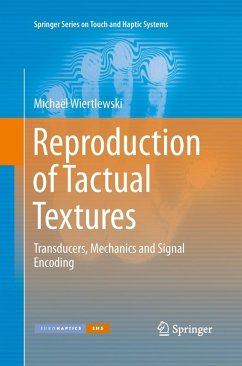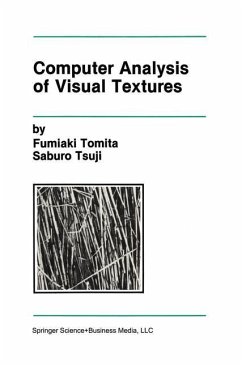Texture accounts for an important part of the realism of simulated experiences, and it is most certainly true during tactile interaction. We usually experience roughness by running our fingers onto the explored surface. The perception of this fine texture is mediated by the vibrations generated by the encounters of the skin and the asperities of the surfaces.
Reproduction of Tactual Textures presents factors that contribute to the mechanics of the interaction between a bare finger and a surface with a view to their artificial reproduction. It discusses the recording and reproduction of tactual textures, and analyses a case study of the development of a device able to record the vibratory signal from a fingertip sliding over a textured surface. The same device is then used in a reverse way to render those previously measured signals to the user's fingertip. These developments open new questions about the biomechanical properties of the skin and their relation to perception. The second half of Reproduction of Tactual Textures focuses on the implication of the dynamic parameters of the skin onto rendering performance, and it concludes with a study on the important features that are present in the vibratory signal and their relation to texture perception.
This state-of-the-art volume highlights the importance of the mechanics and biomechanics during the haptic exploration of surfaces and their possible contribution to perception. Collectively, the findings reported are pertinent to many applications, including robotic perception and the design of effective virtual reality systems.
Reproduction of Tactual Textures presents factors that contribute to the mechanics of the interaction between a bare finger and a surface with a view to their artificial reproduction. It discusses the recording and reproduction of tactual textures, and analyses a case study of the development of a device able to record the vibratory signal from a fingertip sliding over a textured surface. The same device is then used in a reverse way to render those previously measured signals to the user's fingertip. These developments open new questions about the biomechanical properties of the skin and their relation to perception. The second half of Reproduction of Tactual Textures focuses on the implication of the dynamic parameters of the skin onto rendering performance, and it concludes with a study on the important features that are present in the vibratory signal and their relation to texture perception.
This state-of-the-art volume highlights the importance of the mechanics and biomechanics during the haptic exploration of surfaces and their possible contribution to perception. Collectively, the findings reported are pertinent to many applications, including robotic perception and the design of effective virtual reality systems.








